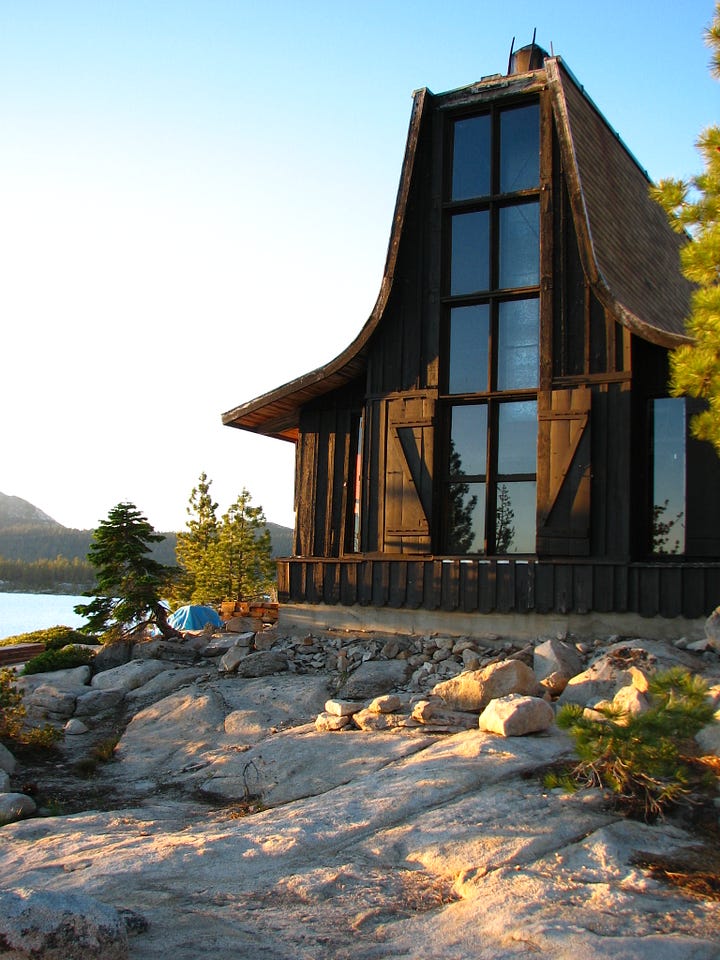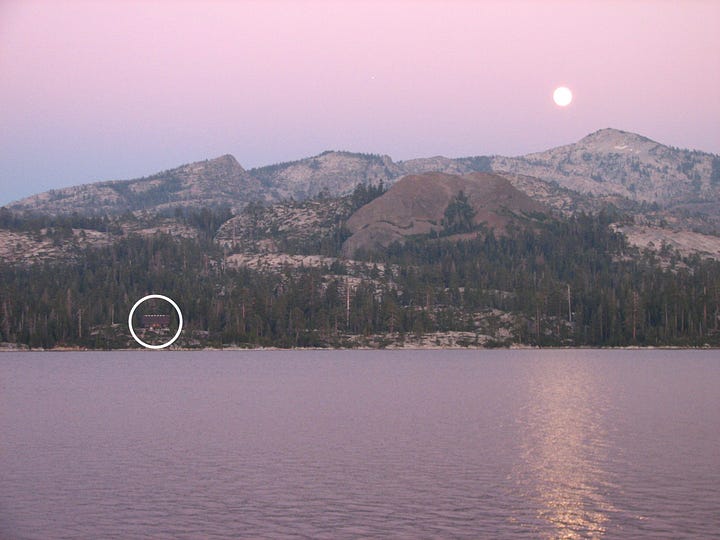The Lodge
or, how I discovered romanticism at a wilderness summer camp in California
[An unused excerpt from the Dirtbag Rich manuscript.]
I once worked at an abandoned boy scout camp, six thousand feet above sea level, adjacent to 64,000 acres of pine forest, glacial lakes, marmot dens, and granite ridgelines known as Desolation Wilderness.
Renovated and reopened as a private summer camp the same year I entered the world, 1982, Deer Crossing was the only permanent facility on a dramatic, mountain-ringed reservoir. Four times a summer, 30-50 campers would arrive from the San Francisco Bay Area to canoe, climb, sail, windsurf, kayak, backpack, and sleep in tents pitched on dirt platforms. No road, power, or phone lines reached the site. Water was pumped from the lake. Food, luggage, construction materials, and gasoline for generators were boated in. To reach the property, campers hiked two dusty miles on trail from the parking lot where the bus dropped them. Dehydrated, disoriented, and swatting madly at mosquitos, many an 11-year-old second-guessed their recent life choices on the walk into Deer Crossing.
Then they saw the lodge.


Like an upside-down Noah’s Ark, the lodge was Deer Crossing’s giant, wooden, pulsing heart, offering solidity and security in an otherwise harsh wilderness. During mealtimes and evenings it overflowed with noise and bustle. Midday, a sleepy, sun-drenched calm prevailed. When most of camp departed for three-day backpacking and canoe trips at the end of each session, the voices that remained echoed through the rafters, beckoning life’s return.
To spend two weeks as a young person at Deer Crossing was an exercise in courage-building through repeated minor trauma. The icy swim test, the solo night walk, the mouth-to-mouth resuscitation scenario, the double-upside-down canoe rescue, and the daily confrontations with rock, dirt, sun, wind, and water conspired to sharpen the edges of otherwise soft, sensitive, suburban kids whose lives revolved around schoolwork and computer games. I was one such kid. For four summers between age 11 and 15, I learned to walk in the mountains, sleep under the stars, scrub greasy pans, windsurf, and flirt. The lodge became a new home, one where I met the new Blake I became each summer.
What I would only discover later, when I returned to work at the camp at age 20, is that the Deer Crossing lodge was also a factory.
Late each night, while campers snoozed in the tent village and the director snored in his office, the college-aged staff gathered in the brains and bowels of the great wooden lodge as the latent heat of the California sun radiated from its walls. We came together to laugh, to commiserate, to vent, to decompress, but more than anything else, to fall in love with each other—as friends, co-workers, and occasionally more. The product we busily manufactured each evening was romanticism: the idea that life can be a love story, and we the main characters.
I fell in love that summer—and the next, all over again—with a fellow instructor named Sonia. Two years younger, sinewy and severe, with long brown hair, huge white teeth, a cutting intellect, a booming laugh, and a charming sense of propriety, we caught each other’s eyes during the ten grueling days of instructor training that preceded the campers’ arrival. She taught kayaking, I taught windsurfing, and when our paths crossed and smiles met at the lake’s edge, electricity crackled among the pines. Each night we sat a little closer on the lodge’s dusty foam couches. When we joined the other instructors to floss and brush our teeth in the dark hallway outside the bathroom, Sonia’s hand would find mine, our fingers dancing in the shadows.
Sonia was also a former Deer Crossing camper, and our shared childhood love for the camp’s eccentric, Indiana Jones-style director* brought us closer together as we teased, provoked, flattered, and (mostly) obeyed him. At the end of each 2-week session, we walked and paddled into the backcountry alongside other instructors who had become our close friends, tantalizing our little troupes of campers with riddles and word games, organizing spontaneous games and naps and swims and competitions, ruling our wild fiefdoms with benevolence and humor and summer sausage, sleeping side-to-side as the Milky Way spun above. On the rare day off our crew boated across the lake, hopped into someone’s car, and plummeted downhill to reach Lake Tahoe where we packed into motel rooms, ate Mexican food, guzzled golden beer, and tasted just enough civilization to happily return to the hermit kingdom the next morning. As our friends sped uphill, hugging the curves of mountain roads, Sonia and I hugged in the backseat, as we returned to our lodge, our home, our factory of dreams.
When the summer ended, so did the love affair. Down in the cities, we seemed to breathe different air, to be different people. Our connection flourished only in the intense, fleeting, high-altitude context of the mountain camp, our alliance of fellow instructors, and the merry bands of surrogate children in our care. Camp was not “real life”—this I grasped. Yet two summers at Deer Crossing had splintered me asunder regardless. I was 21 and fully aware of how work, romance, and purpose could form a unified whole, how coworkers could become best friends, how the hardest labors could feel like no labor at all, and how nature could be the glue that brings it all together.
I would not leave this knowledge in the mountains, nor would I lock it in a box labeled “summer fairy tale.” To live with intensity, to feel in love constantly, to wake and walk amongst beauty, and to serve others while living my adventure—this was the high-energy nucleus of future dirtbaggery that formed inside me, the one that would keep money, status, and security in a distant orbit as I pursued an impossible, romantic, effervescent vision of life.
We all have a god. This became mine.
You know of what I speak, because you, too, have tasted the fruit and felt the wholeness. You have been infected by romanticism. Your lodge and mine are not the same, yet here we are.
What was it for you? A job, a community? A foreign land, a moment in nature? A mentor, a lover, a family member? A book, a movie, a piece of art? A crisis, a breakdown, a tragic loss? What tipped the scales, knocked you off course, and sent you tumbling down this path?
Do you struggle to do anything that doesn’t speak to your inner romantic core? Do you hesitate to share time with those who don’t speak your secret language of ecstasy and transcendence? Have you said no to perfectly reasonable jobs, partners, homes, and opportunities in favor of something called “purpose” or “adventure?” Do you hike, climb, ski, surf, run, cycle, write, draw, dance, paint, or build your way through the world, migrating and gyrating and dodging every snare and cage, glistening eyes forever fixed on a distant horizon?
We dirtbags—and proto-dirtbags, and dirtbag-adjacents, and (hopefully, soon) dirtbag rich—are no more pure, superior, or enlightened than those around us. We are actually quite helpless. Our dreaming and romanticizing depend on much more normal humans—those oriented toward security and predictability—to pour the concrete on which we dance. Hopefully we offer a worthy gift in return. We are privileged and we are broken. Our obsessions with movement and novelty aren’t mere reflections of courage or creativity, they are our escape routes from depression. In other worlds and in earlier eras, we might already be dead: shunned, starved, persecuted, jailed, or abandoned. We exist because our time and place accepts, permits, and sometimes even rewards our weirdness, our divergence, our unique flavor of brokenness.
The path to dirtbag riches does not begin with a 360° financial review, a brilliant business idea, or a converted Sprinter van. It begins by asking what brought you here—to this very moment, to these very words.
How did you find this book? What relationship, what line of inquiry, what unsolved problem, or what unmet need collided your mind with mine? Where did you learn how different you are, and how life can be lived so differently?
Summon the people and places, the conversations and conflicts, the flashing moments and unending adventures. Revisit your lodge and the people within it. Sit and speak with them, metaphorically or not. Seek the emotional singularity within you, the one forever sabotaging your attempts at normality, forever whispering, life can be so much more.
This is why you’re here.✹
Thanks to Anne, Matt, Mary Ann, Bee, Julie, and Sonia for reading a draft of this.


Really enjoyed the energy and rhythm of this! It also hit me how your story about falling in love with Sonia morphed into falling in love with your chosen life. Can't wait to read more!
Nice. As a summer camp camper and staff member myself, I found your post super relatable. Spot on.
Regarding the moment that tipped the scales in the dirtbag direction I am currently following, check out this post:
https://open.substack.com/pub/twdondanville/p/rock-climbing-changed-my-life?utm_source=share&utm_medium=android&r=jcyrr
Read and responded to from inside my 1998 Ford E150 converted camper van. After another coffee and some breakfast, I'll be headed to the cliff to guide for the day.